Introduction
Many people strive to slim down, but the journey can be arduous. The importance of exercise cannot be overstated when it comes to your diet. Here are ten of the most effective and sustainable diet tips for losing weight
1. Prioritize Whole Foods
Understanding Whole Foods
The concept of differentiation with regards to the consumption of foods is also important and it refers to whole foods which are foods with minimal processing and usually come close to the natural form. These include fruits, vegetables, whole grains, lean meat, nuts and seeds. These foods are nutrient dense, low calorie, high fiber and good fat foods, which should form the base of any weight loss plan.
- Nutritional Value of Whole Foods and How They Contribute to the Process of Shedding off Some Weight
- Nutrient Density: Minerals and vitamins which are present in whole foods are helpful in our overall health and aid in metabolism.
- Satiety: Whole foods contain fiber which makes you eat for longer without the need to take more food, hence avoiding overeating.
- Practical Tips
- Eliminate white rice and pasta and all products made from refined wheat and replace it with quinoa, brown rice and whole wheat bread.
- Try to include different colors of vegetables in your meals so as to have all the nutritional colours as well.
2. Control Portion Sizes
Porter asked the importance of portion control into the eating patterns of eating-disordered women as well as the influence that media images incorporate into the women’s food choice decisions.
- In other words, even fruits and vegetables can also result in weight gain in case they are consumed in large amounts. As you eat your foods, try to take small portions so that you do not over eat because this will lead to intake of more calories than your body can handle.
- Strategies for Managing Portions
- Use Smaller Plates: Here are the tips for avoiding overeating, which don’t have to make you feel you lack absolutely everything:
- Measure Your Servings: Measuring cups or a food scale should also be used to measure appropriate portions preferably those with high calories such as nuts, oils and grains.
Mindful Eating
- It is wise to listen to your body and avoid overeating which can be achieved when you take your time when taking meals. Eat without distraction like watching television or phone and try to eat mindfully by paying attention to the hunger and satiety signals.
3. Reduce Added Sugars
The role of Added Sugars and Weight Gain
Those sugars include any natural sweeteners that have been introduced to the food during processing and preparation and are sources of empty calories. Increased intake of sugars increases weight gain to particularly the abdominal region.
Identifying Hidden Sugars
- Read Labels: Always read the labels of the food items that you are taking to identify other names of sugar such as sucrose, glucose, high-fructose corn syrup and so on.
- Avoid Sugary Drinks: Canned beverages including soft and energy drinks together with fruit juice contain high levels of added sugar. Just switch to water, herbal teas or other non-sugar containing drinks to your body.
Practical Tips
- It is advisable to offer some replacement for sweets like fruits, yogurt or nuts.
- If you want something sweet and can’t help but indulge, try natural sweeteners which include stevia or monk fruit.
4. Eat More Protein
here are some of the advantages of taking protein to anyone who wants to lose weight:
Macronutrient plays a vital role in weight loss with protein being one of the most important. In this way, the body rebuilt and repairs muscles, improves metabolic processes in the body as well as enhances the satiety factor.
High-Protein Foods to Include
- Lean Meats: Sources of proteins include chicken, turkey and lean meats such as beef.
- Plant-Based Proteins: Some examples include beans, lentils, tofu and quinoa where the individual is a vegetarian or chooses to eat vegetables only products.
- Dairy: These protein sources include Greek yogurt, cottage cheese, and eggs that contain high quality proteins/essential nutrients.
Practical Tips
- It is recommended that you should incorporate protein in every meal as well as in between meals snacks to ensure that even when you are losing weight, you do not loss muscle mass.
5. Incorporate Healthy Fats
The Extent and Importance of Fat as Part of People’s Diet
There is a difference between good and bad fats, it is the case that not all fats are bad. Not all fats have desirable effects; some can lead to weight gain and other health problems but healthy fats are needed by the body and can help with the shedding of some extra pounds.
Types of Healthy Fats
- Monounsaturated Fats: These fats are regularly found in olive oil, avocados and nuts and they help to decrease LDL cholesterol hence improving the conditions of the heart.
- Omega-3 Fatty Acids: Omega-3 which is found in salmon, chia seeds and walnuts are inflammatory and aids in promotion of brain health.
Practical Tips
- Instead of use butter and margarine, use healthy oil of your choice such as olive or avocado oil.
- Sprinkle a few nuts or seeds on the salads, yogurt or oatmeal, so as to include some amount of healthy fats in your diet.
6. Stay Hydrated
Hydration and Weight Loss: What’s the Connection?
Hydration is also a vital factor that help in digestion of foods, metabolism of body cells and getting rid of waste products in the body. This implies that drinking a lot of water can assist an individual to avoid the feeling of hunger thus avoiding over consumption of food.
- Now that you know the different types of water and some of the benefits that come with it let us answer the much asked question on the flyer.
- Try to have at least 8 glasses of water a day or approximately 2 liters a day. But this depends on your level of activity, the weather and your medical condition.
Practical Tips
- Start Your Day with Water: Start your day with a glass of water: your metabolism will immediately start to work actively.
- Carry a Water Bottle: When the water is out of sight it is out of mind so by having water accessible at all time it can help a person remember to consume more water and thus be more hydrated.
7. Assuming Better Control over Your Eating Habits
Possible Benefits of Meal Planning
When you are preparing your meals for the day or the week, you are less likely to make unhealthy choices, order take-out and you can more easily manage the portions you are taking.
Meal Prep Tips
- Plan Weekly Menus: Make a seven-day meal calendar that will feature extra careful meals and midsection busting snacks. This can greatly help you save time and avoid the lure of eating junk foods such as pizza, burgers and fries etc.
- Batch Cooking: Cook in abundant large portions which can be split into other portions for consumption during the following days.
Practical Tips
- Some other products to buy include quality food storage containers in order to store the prepped meals for future use as well as portability.
- Choose the forms of cooking that are not complicated, and that do not require much effort to prepare in advance, but are tasty and healthy.
8. Limit Processed Foods
Implication of Processed Foods on Weight Loss
Canned foods are usually rich in energy density and nutrients of negative impact such as fats, sugar and sodium while lacking appropriate amounts of important nutrients. They also contain high calories which give you extra pounds when you frequently consume them without exercising.
Identifying Processed Foods
- Common Examples: Candy and baking products, fast foods and takeaway products such as cookies, soft drinks, confectionery products including chocolate and baked foods, processed meat products, ready to eat meals, processed foods, cereal products and other processed foods high in sugar content.
- Check Ingredients: A food item with multiple ingredients is, most probably, highly processed especially if it contains additives and preservatives.
Practical Tips
- Nearly all of your meals should consist of ‘real’ or minimally processed foods in their purest form.
- In a more elaborate way, try to cook your meals and avoid going for processed foods most of the times.
9. Don’t Skip Meals
When they reduce food intake to loss Calorie diets, they get it wrong in several ways.
If one decides to miss meals, say breakfast, he or she is likely to overindulge the rest of the day besides the metabolism rate slowing down. It prevents cases of hoggishness that comes with extreme hunger as well as balance the glucose levels in the body.
Regular Eating : What It Is and Why It Matters
- Metabolism: The idea is to eat more often but in small portions so as not to get the metabolism slowing down through the day.
- Satiety: Eating habits that involve taking meals at proper times and makes sure that the meals meet the nutritional value will reduce the instances when people or the individual will end up taking foods that are rich in carbohydrates.
Practical Tips
- Have a Healthy Breakfast: Have a non-calorie breakfast with protein, fats, and fiber so that you get energy for the rest of the day.
- Pack Snacks: Pack fruits, yogurts or nuts for an instance when one is forced to make an unhealthy eating decision due to hunger.
10. Practice Mindful Eating
What is Mindful Eating?
This type of eating entails concentration on the process of eating as well as the consumption of drinks. It helps you pay attention to your hunger, and fullness levels and teach you how to make food choices depending on the physical feelings associated with eating.
Advantages of Mindful Eating for the purpose of Losing Weights
- Improved Digestion: These include; taking time to eat and chew thoroughly as they help in digestion and assimilation of the nutrients.
- Reduced Overeating: Being a conscious eater helps one notice when they are full avoiding instances where they would eat more than necessary for the body thus helping in their weight loss regime.
Practical Tips
- Eliminate Distractions: This means that you should avoid some bad habits such as watching TV or using smartphones while eating.
- Savor Each Bite: Be patient enough to savor each of your meal’s taste, touch, and smell. This can add flavor to your food and make you gain a feeling of fullness with less food intake.
Conclusion
Diet is the key to achieving sustainable weight loss by making smart choices. To achieve your weight loss goals, follow these ten diet tips that are easy to follow and provide optimal nutrition. Consistency is crucial, and minor adjustments can result in long-term benefits. Don’t settle for perfection, but instead strive for a better version of yourself.

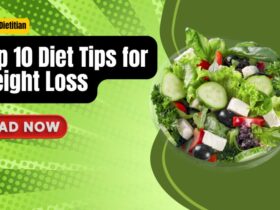



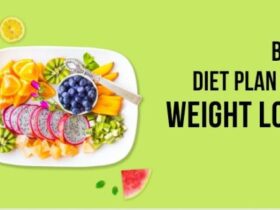
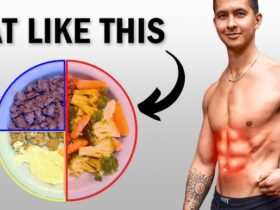
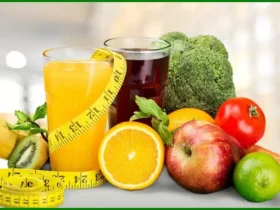
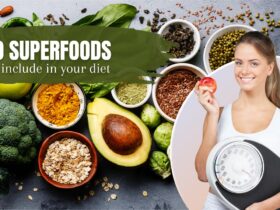
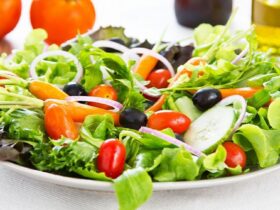
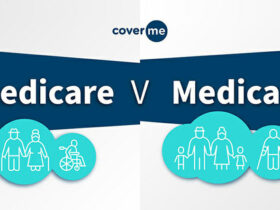



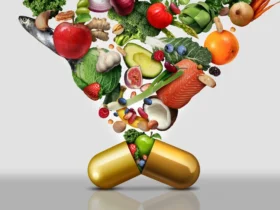
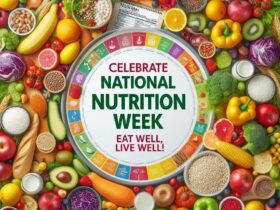
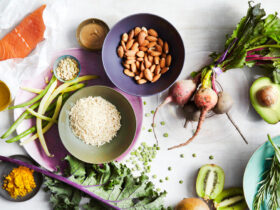
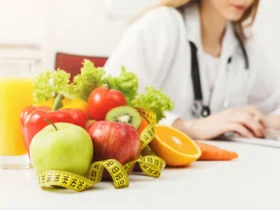
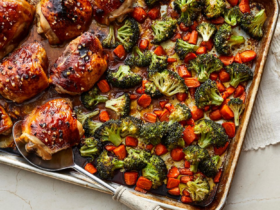
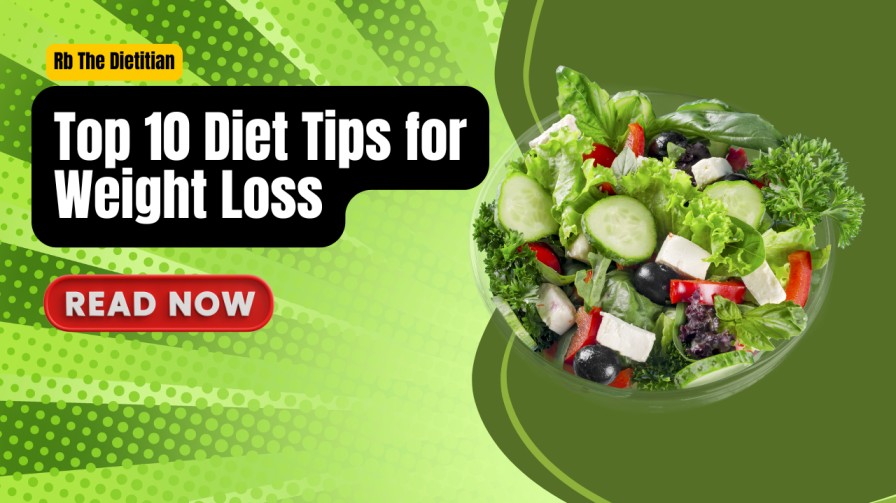
Leave a Reply